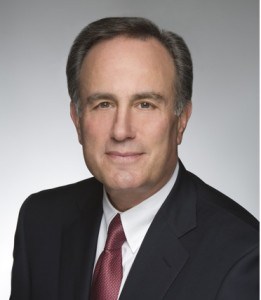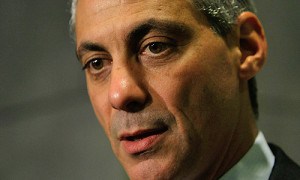 Verizon Communications is indefinitely finished expanding FiOS — its fiber to the home triple-play package of broadband, phone, and TV — to new cities across its service area. In short, if your community isn’t already engaged in franchise negotiations with the telecommunications company, there is no fiber from Verizon in your immediate future.
Verizon Communications is indefinitely finished expanding FiOS — its fiber to the home triple-play package of broadband, phone, and TV — to new cities across its service area. In short, if your community isn’t already engaged in franchise negotiations with the telecommunications company, there is no fiber from Verizon in your immediate future.
The company said after spending $23 billion upgrading its aging copper wire phone network, it needs to finish construction and improve its reach in existing FiOS-wired communities. When the company ceases FiOS construction, it hopes to pass 18 million customer homes across its multi-state service area.
The decision to stop expansion of advanced fiber optics threatens to leave hundreds of communities behind, too late to the party or simply too far down Verizon’s priority list. Among important cities Verizon will pass up include Alexandria, Virginia, Boston and Baltimore.
That concerns city officials, especially in Baltimore which already considers itself on the disadvantaged list.
“My take on it is that Baltimore is not equipped for the future,” Rev. Johnny Golden, past president of the Interdenominational Ministerial Alliance and an advocate for improved access to technology in the city told the Baltimore Sun. “We have a decent broadband system for today, but it does not have the infrastructure to take us into the future where we need to go.”
 Despite the fiber bypass, the company will continue negotiations with about a dozen communities where negotiations were already underway – mostly in New York, Massachusetts, and Pennsylvania. Despite company spin, the decision to drop the shovels and wheel away the spools of fiber does represent a dramatic change of plans, evidenced by the company’s decision to bypass the aforementioned lucrative urban communities.
Despite the fiber bypass, the company will continue negotiations with about a dozen communities where negotiations were already underway – mostly in New York, Massachusetts, and Pennsylvania. Despite company spin, the decision to drop the shovels and wheel away the spools of fiber does represent a dramatic change of plans, evidenced by the company’s decision to bypass the aforementioned lucrative urban communities.
For cable companies like Comcast and Time Warner Cable, Verizon’s announcement brings a sigh of relief. Both cable operators handily beat Verizon’s DSL offerings and are swiping increasing numbers of Verizon’s phone customers who are disconnecting their landline service in favor of cell phones or “digital phone” service from the cable companies.
Both Time Warner Cable and Comcast have also kept a larger percentage of their customers than Verizon hoped.
In markets where FiOS is available, Verizon has only achieved 25% penetration for television service and 28% for Internet, far below the 40 percent penetration Verizon CEO Ivan Seidenberg hoped to achieve. The reasons consumers didn’t switch to Verizon FiOS vary, but include:
- Pricing was not always lower than what the incumbent cable operator offered, and in many cases prices for some service were higher once the promotional rate expired;
- Cable operators in competitive areas improved service, offered more aggressively priced bundles, and increased broadband speed;
- Many cable operators locked their customers into two year “price protection agreements” which hold customers in place until agreements expire (if they don’t auto-renew);
- Installation can prove disruptive because of the elaborate rewiring required in many homes;
- Consumers didn’t see enough compelling reasons to switch.

Seidenberg
Still, Verizon has future-proofed their fiber optic service areas and are better positioned to deliver extremely high broadband speed and HD offerings than their cable counterparts. But that has never impressed short-term focused Wall Street. Many in the financial press have attacked Verizon for the costly fiber upgrades they believe will not work for the short-term investor seeking immediate return from their Verizon stock purchase. With the rumor mill predicting upcoming retirement for Seidenberg, his likely successors are hardly FiOS fanboys.
John Killian, Verizon’s current chief financial officer, is a short-term results man. Samuel Greenholtz, an analyst with the Gerson Lehrman Group, doesn’t see Killian sharing much of Seidenberg’s visionary long term thinking. Lowell McAdam, another prospect for the top job, is currently the president of the Wireless Services division, and would likely bring a wireless “solution” for broadband customers left off the FiOS list. Neither man seems particularly interested in restarting the push for fiber in the future.
For 2010, capital expenses are flat or down across the company except in the Wireless Services division. Verizon already declared copper phone wiring dead, and has elected to abandon its rural and suburban customers, systematically sold off to America’s “rural phone companies” Frontier, CenturyLink, or Windstream. Those still with Verizon but without FiOS will find the future of their landlines increasingly perilous. Greenholtz notes Verizon has terminated another 1,200 line technicians and the company intends to spend two percent less on its copper wire network this year over last.
Greenholtz witnessed first hand what happens when a company starts to ignore its legacy network — his residential phone line quit working:
Having worked at Verizon and its predecessors for over 25 years, I expected a fix would be swift and trouble-free. Wrong. I was offered a two-week appointment date for repair people to come out and look at the problem. I might add here that my wife does not use the cellular device that she carries around anymore than necessary and certainly never uses it when in close proximity to the hardwired set. By resorting to measures that I certainly would never have thought of using 10 years ago, I was able to get attention brought to the problem much quicker — and the issue has been resolved satisfactorily.
It seems that Verizon’s residential repair and maintenance has sunk to a new low. Neighbors and other people on copper cabling are often experiencing problems. If there is static on the line, subscribers are frequently told nothing can be done to correct the situation because they need to replace the cable or do cable maintenance – but there is no budget available to do the work. So, repairmen take the brunt of the public’s unhappiness with the service they are receiving. In contrast, when I spoke with some friends regarding FiOS and its maintenance issues, I found a much better response time to any difficulties the customers were experiencing.
Shockingly for a Wall Street-focused “expert network,” Greenholtz was allowed to offer his belief the only real solution to phone companies ignoring their undesirable customers is to regulate the heck out of them.
What can be done to cure the situation with residential landline services? Unfortunately, it is going to have to come down to regulation. Verizon, and no doubt, AT&T, has been doing what they want for many years now. The PUCs have given them a lot of opportunities to offer advanced services that the commissions thought would spread throughout the serving areas, but they are increasingly realizing that is not in the plans. They are going to have to force these companies to be responsive to the needs of the entire footprint, not just the Fortune 500 territories — and the nearby residential homes.
[Update 4/1/2010: While working on another story, I was amused to discover we had written about Mr. Greenholtz before, back on April 15th, when he was telling his readers “do-gooders” forced Time Warner Cable to attempt usage caps on customers. I wonder if we would have heard something different from him had his broadband service faced an Internet Overcharging scheme.]
Blind deregulation and legislative-friendly handouts to companies like AT&T and Verizon have never resulted in better service for consumers. They haven’t proven to save consumers any money either. Ultimately, the decision to provide FiOS and U-verse came with investor consent, and when the economic downturn threatened the value of the stock and dividends, no deregulation or statewide franchise agreement is going to keep the fiber party from coming to a close.
[flv]http://www.phillipdampier.com/video/WSYR Syracuse Verizon FiOS Winds Down 3-26-10.flv[/flv]
WSYR-TV in Syracuse reports on the demise of Verizon FiOS’ expansion plans, which have a significant impact on central New York where many communities will be left behind. One saving grace for New Yorkers ticked off at Albany — they’re now off the FiOS list indefinitely. (2 minutes)
 Verizon CEO Ivan Seidenberg has sent the strongest hints yet that Verizon’s interest in going the extra mile to acquire the Apple iPhone is waning, and the company is increasingly unlikely to make major concessions to carry it.
Verizon CEO Ivan Seidenberg has sent the strongest hints yet that Verizon’s interest in going the extra mile to acquire the Apple iPhone is waning, and the company is increasingly unlikely to make major concessions to carry it.

 Subscribe
Subscribe




